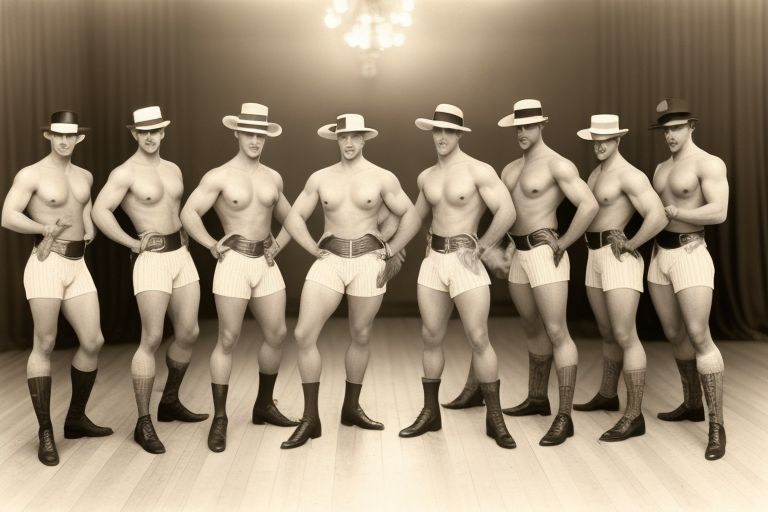- Dancers at Chippendales are taking a serious step by seeking to unionize with the Actors’ Equity Association to secure better pay and treatment.
- Actors’ Equity Association has been broadening its scope, now supporting not just theater performers but also dancers in adult entertainment, bringing union representation to a new audience.
- Vegas is a union town, and the push for unionization signals a shift in the industry, demanding a workplace that reflects the talents and hard work of its performers.
If you ever thought that the world of entertainment was all glitz and glam, the recent moves by the Chippendales dancers might just unravel that perfectly polished facade. Yes, you heard that right – those chiselled physiques and sultry dance moves may soon be joined by something less sultry but equally significant: a union card.
Chippendales: More Than Just Dance
For the uninitiated, the Chippendales are not merely a troupe of attractive men strutting their stuff in the neon lights of Las Vegas. They’re a cultural phenomenon, a brand firmly rooted in adult entertainment that has become a rite of passage for bachelorette parties and girls’ nights out. With performances that blend humor, dancing, and rhythm (seriously, don’t let anyone tell you choreography isn’t impressive when it involves a six-pack and a wink), the Chippendales have made a name that goes beyond just raunchy entertainment.
Why Unionization?
So, why now? You’d think that a gig involving scantily clad dancers and roaring applause would be a cushy ride, right? Apparently, that’s not the case. The dancers—who you might imagine are living the high life—are pursuing unionization with the Actors’ Equity Association for some pretty valid reasons:
- Higher Wages: They’re tired of being underpaid for the world-class entertainment they deliver.
- Better Benefits: Health insurance, retirement plans, and the assurance of having a safety net are all on the wishlist.
- Workplace Safety: Nobody wants to be overworked with no support in place, especially in a physically demanding job.
- Accountability: They want the reassurance that they can enjoy their profession without fear of exploitative practices.
As one of the dancers leading the charge put it so eloquently, “We love Chippendales and value being a part of this incredible institution. But we also believe our situation here isn’t keeping up with industry standards.”
So here we have it—a group of performers who want the respect and recognition that they rightfully deserve. It’s kind of like the concerted effort you’d see in a schoolyard when the nerdy kids finally decide they’ve had enough of being picked on. Only, in this case, the stakes are higher, and the drama unfolds under the pale glow of nightclub lights rather than fluorescent ones in a gym.
Actors’ Equity: Expanding Beyond Broadway
While many associate the Actors’ Equity Association purely with Broadway theatrics, they’ve been busy expanding their reach.
Here’s a quick rundown:
| New Frontiers | Description |
|---|---|
| Strip Clubs | Recent successes at Magic Tavern in Portland and Star Garden in LA. |
| Disneyland Characters | Ensuring performers have representation. |
| Planetarium Lecturers | Yes, even they deserve a union! |
| Drunk Shakespeare Companies | Even Shakespeare can be a little tipsy. |
This modernization of the union’s role speaks volumes about changing perceptions in the entertainment world. Gone are the days when only traditional performers had a seat at the table; now, it’s all about inclusivity and fair representation.
Las Vegas: The Ultimate Union Town
If you’re thinking Las Vegas sounds like the last place you’d find a union movement, think again. With a history of successful unionization—like the Culinary Workers Union organizing hospitality workers coursing along the Strip—Vegas is ready to embrace its union-friendly reputation.
Marci Skolnick, a local Equity leader, echoed this sentiment, saying, “The entire Las Vegas Equity community is thrilled to welcome the Chippendales into our ranks.” The dancers are being recognized not just as entertainers but as professionals deserving fair contracts and benefits. This transformation is reminiscent of the labor movements seen in industries like hospitality, where workers have organized to demand better treatment.
What Does This Mean for the Dancers?
Let’s break down what unionizing with Actors’ Equity could mean for the Chippendales dancers:
- Stronger Negotiation Power: As a union, dancers can negotiate wages and working conditions without fear of retaliation.
- Access to Resources: They’ll gain access to legal help, health benefits, and other essential resources that help stabilize their careers.
- Networking Opportunities: Being part of a recognized union opens doors to other performances and opportunities, making career transitions smoother if they choose to branch out.
- Job Security: Unions can work to create and promote job security policies, which is particularly relevant considering the fluctuating nature of performances.
The Bigger Picture: What’s Next?
So, what’s next for these strippers of the stage? Once the union petition has been filed with the National Labor Relations Board (NLRB), it’s a waiting game. They’re currently seeking voluntary recognition from their employer, which could streamline processes and prevent any lengthy disputes. If there isn’t a swift agreement, we might be talking about a more significant upheaval in how establishments like Chippendales operate.
Now, let’s not overlook how this movement could impact the industry at large. We may soon see a ripple effect, encouraging performers in other adult entertainment venues to push for similar rights. Is the era of exploitation in entertainment waning?
Rhetorical Reflections
Isn’t it fascinating how a group of dancers can challenge the status quo? Just think about it—when you strip away the theatrics, what you have is a simple desire for respect. Isn’t that what we all want in our careers? Fair treatment, acknowledgment of our hard work—and perhaps a seat at a table that once felt unapproachable.
A Personal Anecdote
I remember my first trip to Vegas—bright lights, iconic shows, and yes, a brief stint at one of those cabarets where I balanced nachos on my lap while watching. It hit me then that each performer is a cog in a larger machine, hardly owning the glamour that surrounds them. Behind each smile was a story—sacrifices made, dreams chased, and often, disillusionment faced.
The Ethical Dimension
In all this glitz and glamour lies an ethical conundrum. Can adult entertainment thrive through fair practices, or will the industry always flirt with exploitative tendencies? Organizations like Actors’ Equity stepping into the mix suggest a shift toward substantive change.
As we move forward, we’ll need to keep questioning: How do we create an environment where performers can thrive without sacrificing their dignity?
In Closing
It remains to be seen how this unionizing effort will unfold, but one thing is clear: the Chippendales dancers are not just stripping; they’re stripping away the culture of silence surrounding their workplace issues. With each move toward unionization, they stand to not just elevate themselves but inspire others in similar industries, encouraging a collective call for change.
So whether you see these dancers as mere entertainers or advocates for worker rights, it’s clear: the conversation around labor in all realms of entertainment is changing, and it’s about time.
Join the Conversation
What do you think about the Chippendales seeking to unionize? Is this movement merely a flash in the pan or an idea whose time has come? As the narrative continues to unfold, let’s keep the dialogue alive.
In the entertainment world, there are always trade-offs between art and the artist’s rights, and it is only through open conversations that we can navigate these waters effectively. What are your thoughts?
Share this article, bookmark it, or let’s just chat about it—because this conversation is just getting started!



